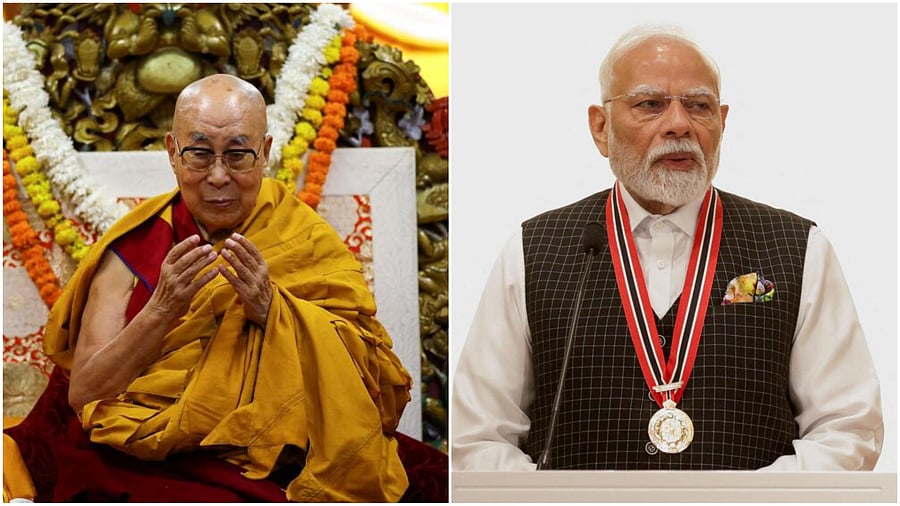
The Dalai Lama (left), PM Narendra Modi (right).
Credit: Reuters Photos
New Delhi: Prime Minister Narendra Modi led India in wishing the 14th Dalai Lama a long life as the Tibetan Buddhist monk and the icon of non-violent protest against the occupation of Tibet by China turned 90 on Sunday.
Kiren Rijiju, the Union Minister of Parliamentary Affairs, not only attended the celebrations on the occasion of the 90th birthday of the Dalai Lama at Dharamshala in Himachal Pradesh, but also tacitly acknowledged the existence of the Tibetan Government in Exile (TGiE), formally known as Central Tibetan Administration, as well as the Tibetan Parliament in Exile (TPiE) – a move, which could add to ire of Beijing.
The prime minister took to X to convey his greetings to the Dalai Lama on his 90th birthday – an annual courtesy he started extending since 2021, a year after China’s military aggression along its disputed boundary with India led to a violent and fatal face-off in Galwan Valley and started a stand-off all along the Line of Actual Control between the two neighbours in eastern Ladakh.
“I join 1.4 billion Indians in extending our warmest wishes to His Holiness the Dalai Lama on his 90th birthday,” Modi, currently on a foreign tour, posted on X early on Sunday. “He (Dalai Lama) has been an enduring symbol of love, compassion, patience and moral discipline. His message has inspired respect and admiration across all faiths. We pray for his continued good health and long life.”
The prime minister’s public greetings to the Dalai Lama had in the past riled Beijing, which had conveyed its displeasure to New Delhi, stating that India should abide by its commitment to China and stop using issues related to Tibet to interfere in the internal affairs of China.
Rijiju attended the celebration of the Dalai Lama’s 90th birthday in Dharamshala, the seat of the TGiE (CTA), which the Tibetan leader had set up after his escape from China-occupied Tibet to India in 1959. He not only referred to the Dalai Lama, but also Penpa Tsering, the Sikyong or the elected head of the CTA, Yeshi Wangmo, Chief Justice of the CTA, and Khenpo Sonam Tenphel, the Speaker of the TPiE, at the beginning of his speech.
New Delhi is the past never officially acknowledged the existence of the TPiE and the TGiE (CTA), in India. Beijing, however, often pressed New Delhi to shut down the CTA, which calls itself a continuation of the government of independent Tibet
Pema Khandu, the Chief Minister of Arunachal Pradesh, where China claims 90000 sq km of the territory of India, also attended the celebrations in Dharamshala on Sunday.
The four-and-a-half-year-long stand-off between the Indian Army and the Chinese People’s Liberation Army had brought the bilateral relations between the two nations to a new low.
After Modi’s meeting with Chinese President Xi Jinping at Kazan in Russia in October 2024, New Delhi and Beijing had announced the end of the stand-off. The two sides have since been trying to bring bilateral relations back on track.
Modi, however, wished the Dalai Lama on Sunday, even as Beijing recently once again asked New Delhi to exercise caution in its words and actions, stop interfering in China’s internal affairs, particularly on the issues related to Xizang (Tibet), and avoid impacting the improvement and development of India-China relations. Beijing’s reaction came after Rijiju, Union Minister for Minority and Parliamentary Affairs, endorsed the Dalai Lama’s decision about his reincarnation.
The 14th Dalai Lama, earlier this week, not only confirmed that the institution of the Dalai Lama would continue beyond his lifetime but also announced that no one else but the Gaden Phodrang Trust, which he had set up in India in 2011, would have the sole authority to recognise his future reincarnation.
His announcement was a move to counter Beijing’s bid to influence the process of selecting his reincarnation, its plan to prop up a claimant loyal to it and use him to fizzle out the global movement against China’s rule over Tibet.
China strongly reacted to the Dalai Lama’s statement from Dharamshala in India. “The reincarnation of the Dalai Lama, the Panchen Lama and other great Buddhist figures must be chosen by drawing lots from a golden urn, and approved by the central government,” Mao Ning, the spokesperson of the Ministry of Foreign Affairs of the Government of China, said.
Modi, however, avoided the issue of reincarnation while conveying his best wishes to the Dalai Lama on his 90th birthday on Sunday.
The 14th Dalai Lama has been living in exile in India following his 1959 escape from Tibet, which had been occupied by the Chinese People’s Liberation Army (PLA) in 1950-51. The monk, a staunch advocate for non-violence and freedom, has been arguing for “genuine autonomy” – not independence from the Chinese Government’s rule – for Tibet. Beijing, however, still calls him a “separatist” and accuses him of running a campaign to split China.
His meeting with the then Prime Minister Manmohan Singh in August 2010 or his visit to Rashtrapati Bhavan on an invitation from then President Pranab Mukherjee in December 2016 had also triggered strong protests from China. So had New Delhi’s decisions in 2009 and 2017 to let him visit Arunachal Pradesh. New Delhi, however, had maintained that the Dalai Lama, being an honoured guest, would always be free to travel to any part of India.
The 14th Dalai Lama had, in 2011, transferred his temporal power to Sikyong, the democratically elected leader of the TGiE, while he, himself, remained only the spiritual leader of the community. This ended the 368-year-old tradition of the Dalai Lamas being both spiritual and temporal head of Tibet.
